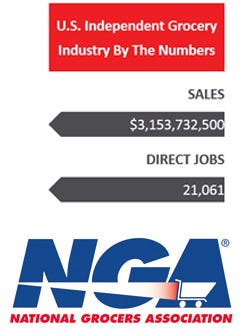Economic impact of independent grocers measuredEconomic impact of independent grocers measured

 Independent food retailers nourish their communities well beyond the selections they sell to their local shoppers.
Independent food retailers nourish their communities well beyond the selections they sell to their local shoppers.
That’s the message the National Grocers Association wants to impart with its newly released Independent Grocers Impact America report. And it’s one natural foods merchandisers know intimately.
The NGA’s report found that 20,884 independent, full-service grocery stores and supermarkets with revenue of $2 million to $5 billion account for:
$129.5 billion in annual sales.
944,205 direct jobs.
$30 billion in wages.
$27 billion in taxes.
The numbers are impressive, and the work even more so. Anyone can visit grocersimpactamerica.com to see just how important independent grocers are in their state, and even further by their congressional and legislative districts.
Such information is a powerful tool when it comes to conversations ranging from serving food deserts to having a voice on Capitol Hill when it comes to issues such as tax, health care and immigration reform, the association pointed out.
Even more importantly, numbers such as these serve as a reminder of the power of independent business of all sizes, including natural retailers who can add a whopping $23.1 billion onto the NGA’s sales figures. (We hope this number will be even higher as we prepare to release Natural Foods Merchandiser’s annual Market Overview in June.)
Natural and organic products have gained traction from Main Street to megastores. Yet, in the natural channel, independents—from supplement stores of less than 1,000 square feet to natural food supermarkets of larger than 6,000—still account for almost 62 percent of nutrition sales.
They’re the ones that know their community, said Dot Peck, the Independent Natural Foods Retailers Association’s director of programs. Her organization represents 103 members with 153 stores that employ 5,250 people and have sales of $739 million. (The Natural Products Association represents 1,118 retailers, but doesn't collect sales and employment data.)
These natural retailers, and their independent supermarket counterparts, are the ones who truly create community. They’re the ones who donate to local charity gift baskets, pull together when a neighbor is in need, field teams for community races and so much more. (The natural stores are the ones leading GMO labeling efforts.) And they really connect one-on-one with their customers, giving them the kind of hometown service that seems missing in the "malling" of America.
Never underestimate the power of community-based business. Hopefully numbers such as NGA’s and NFM’s show just how it all adds up.
About the Author
You May Also Like





